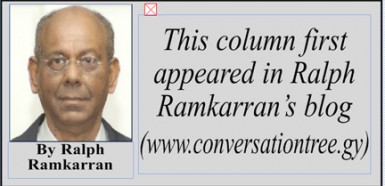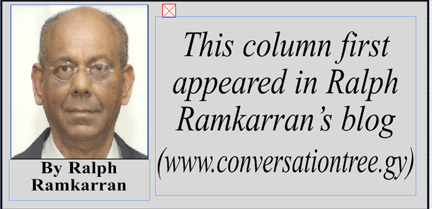Being away for the past six weeks allowed me the luxury of leisurely contemplating Guyana from afar. The news emerging was not encouraging. The prison was burnt  down and prisoners escaped; then more escaped from Lusignan. A disaster waiting to happen, it was said, but nothing of significance was done to prevent it. Perceptions of the Constitution, where it differed from the court’s, were given equal weight. Secret dealings with ExxonMobil are justified on blatantly flawed and trivial excuses. Budget allocations are not being disbursed thus limiting economic activity and job creation. Rupert Roopnaraine resigned, then changed his mind.
down and prisoners escaped; then more escaped from Lusignan. A disaster waiting to happen, it was said, but nothing of significance was done to prevent it. Perceptions of the Constitution, where it differed from the court’s, were given equal weight. Secret dealings with ExxonMobil are justified on blatantly flawed and trivial excuses. Budget allocations are not being disbursed thus limiting economic activity and job creation. Rupert Roopnaraine resigned, then changed his mind.
Freddie Kissoon and Kaieteur News continue their decades long, personal, vendetta against me, because of an apology he and KN were forced to make to me more than twenty years ago. In pursuance of his hate campaign, Kissoon regurgitates stories that I have already fully answered ten and more years ago – answers which he does not reveal when he rambles on, ad nauseam.
He praises Mr Khemraj Ramjattan’s letter, of more than ten years ago, to the press criticizing my firm’s use of the signature ‘Cameron & Shepherd’ in its letters. He did not say that I had responded that this is a world-wide practice by many professional firms, nor that a week or two before, Mr Ramjattan had received from us a cheque signed ‘Cameron & Shepherd’ on behalf of his client for a very large amount in settlement of a case, which he accepted without objection. Kissoon repeats that he never saw signatures of such types in his entire life. For a man who vulgarly boasts an academic career, modest by any standards, investigation would have revealed that right here in Guyana, some accounting firms and legal firms like ‘Clarke & Martin’ and ‘McDoom & Co.’ signed the name of their firms on letters.
Freddie Kissoon is like a life sore on my foot, dormant with treatment, but which explodes in suppuration occasionally. Intensified treatment, such as the letter by T Karran (a name unfamiliar to me) in KN on July 26 (‘Ramkarran will never apologise to inferior quality’) stanches the suppurating flow, until the next time.
Throughout the six weeks, though, my mind kept returning to an event that occurred just before I left. While in the UK I was prodded to think further on the matter after Speaker Bercow of the House of Commons “furiously upbraided” Scottish Nationalist MPs for clapping in Parliament, which tradition strictly prohibits. I recalled that during last year Speaker Bercow called upon Member of Parliament, Dennis Skinner, to withdraw the name “Dodgy Dave” that, while speaking, Skinner had attributed to then Prime Minister, David Cameron. The Honourable Member refused and began to walk out, challenging the Speaker to “do what you like.” He was suspended for the rest of the sitting. Speaker Dr Barton Scotland, a gentle man and a gentleman if there is any, was placed in a similar, unaccustomed, position of having to admonish Members of Parliament for their behaviour.
The Speaker is reported in SN of July 8 to have said: “In acting as they did, Honourable Members appeared to show little regard for the honour of this institution. By our conduct, we give the public, on whose behalf we claim to act, at best a poor lesson on parliamentary decorum. Conduct we display has left our citizens to form other than the highest regard for our parliamentary conduct.” The Speaker referred to several “unprecedented scenes.” “All of them were avoidable and none of them excusable,” he said. Well, when I presided in the National Assembly, there was a boycott by the opposition lasting more than a year. There were countless walkouts. There were “unprecedented scenes” of disturbance, upturning of books, scattering of a flour-like substance and a continuous flow of disrupting behaviour. But apart from opposition members, the Speaker’s own comrades – the members who nominated and elected him – could turn against him and continually undermine his work and his authority. His ‘conduct,’ not that of MPs, could be the subject of weekly Cabinet meetings. That would be painful. But it can get even worse.
Around the world, physical violence in parliaments has become widespread. Violent scuffles erupted in the Ukrainian legislature during a debate to give the Russian language equal status in some parts of the Ukraine. In Somalia MPs stabbed each other with pens, slapped and yelled, during the election of the Speaker. In Nigeria a brawl was sparked by allegations that the Speaker was corrupt. In the Bolivian Parliament, a mass fight erupted during a debate over whether or not to try judges on corruption charges. Taiwan’s Parliament is renowned for descending into frequent, mass brawls. As recent as July 18 a fight took place over disputes as to how to allocate billions in infrastructure spending. Fists and chairs were liberally used. One report explains that opposition parliamentarians resort to violence to obstruct legislation from temporary passage in order to demonstrate their commitment to their constituents.
Our Speaker can take comfort that while our Members of Parliament may violate parliamentary traditions more egregiously than members of the House of Commons, at least ours have not yet descended into fighting.










